Kemal Öztürk talked about the Syrian Revolution and his observations
Journalist and writer Kemal Öztürk was in Syria to witness the first days of the Syrianrevolution. He conducted the first interview with Colani-Ahmet Shara, the leader of therevolution, in the Turkish press and witnessed the surprise visit of Ibrahim Kalın, the head of the National Intelligence Organization (MIT), to Damascus. Our editor-in-chief Bekir Gündoğdu conducted a wide-ranging interview with Öztürk for aximedya youtube channel. Inthese most critical days in Syria, we present to our readers an interview that bears witness tohistory in the heat of the moment, the developments, the atrocities witnessed and the joyafterwards, the possible impact of the revolution on Syria and the region, and the changingprofile of HTS and Colani…
Kritik Bakış
…………………….
Bekir Gündoğdu: Today we are hosting a very special guest in our studio. Journalist andwriter Kemal Öztürk. Kemal Öztürk has just returned from Syria. He was the first Turkishjournalist to meet Colani. He is also the second journalist in the world to do so. We will talk about Kemal Öztürk’s impressions of Syria, the prisons, the Assad regime, the happiness of the people and what the Syrian revolution will bring. We will also talk about the YPG and theUS, which is still trying to maintain its influence in the region. Dear Kemal Öztürk, Maybe it is a question that should be asked at the end, but let’s start with this first. How did the Colani meeting take place? How did you come together?
Kemal Öztürk: Of course, he was a name the whole world was after, the whole world’s mediawas after him. As a journalist, I wanted to interview him. I contacted them through mycontacts and they said that the meeting was possible. I entered Syria from Reyhanlı and in thelobby of a hotel they gathered almost all the journalists of the world. We met there. Therewere around 35-40 journalists. The New York Times, Washington Post, CNBC, CNBC, allTV channels and newspapers were there and I was one of them, we were waiting. But I honestly couldn’t understand how he was going to organize this interview. I mean, you eitherorganize a press conference with such a crowd, or if he speaks for 10 minutes one by one, 35 people would be 350 minutes. We waited for about 7 hours. I waited in the lobby likeeveryone else and the interview didn’t happen. The next day, again through my sources, I pushed the conditions very hard and the interview took place. Again I waited for 5 hours, 4-5 hours and the interview took place. This time I was the only one, all by myself. But of course, I couldn’t get him to sit in front of the camera because of the security and the intensity of theenvironment. I went on behalf of NTV. But despite that, he answered my questions. I had theopportunity to talk to him for about half an hour, 40 minutes. We had our photographs takenand I became the second journalist in the world to meet him. I became the first journalist in Türkiye.
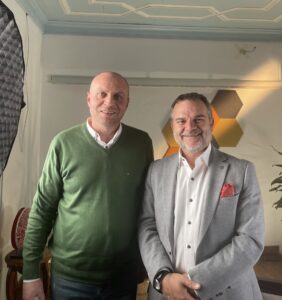
Bekir Gündoğdu: What are your impressions of Colani, real name Ahmet Şara?
Kemal Öztürk: Now, first of all, I found him better than I expected. I mean, there is a perception that has been formed in Türkiye for many years. HTS, the leaders of HTS, areconsidered a terrorist organization. In other words, a name that has been in a conflictenvironment for the last 15 years. But he is wearing a suit. He is not wearing a tie, but he is wearing a suit. I think the first image of him in a suit was spread with the photo taken with myinterview. I saw a political mind. I mean, I saw someone who could act politically, not like a guerrilla, a militant, someone who came from a culture of conflict. Someone who can lookpolitically, someone who can look pragmatist. In that sense, I see this as a positive thing. I mean, he is a leader who can read the world. At least he can see where things are going. I don’t know if he can be a world leader, it’s too early to say. But if you look at the 10-day period after the revolution, his statements are very logical. They are extremely accurate. Thepractices on the ground are extremely positive. Practices that take sociology intoconsideration. In other words, we will not harm anyone’s life or property. We will not interfere with anyone’s work. We will all live together. People are very relieved. Otherwise, there was a group that said HTS will come and cut our heads off. These statements affectedeveryone a lot. A state mind can design these statements. We were talking about this here while we were watching the events in Türkiye. How did it happen, there is a state mind here, these explanations, these practices would not have happened otherwise.
Bekir Gündoğdu: Somegroups are taking this to America, England and even Israel. They say that Türkiye is being managed completely by an external mind, as if it doesn’t exist, as if it doesn’t exist in the equation.
Kemal Öztürk: Yes, I mean like this, there really is a state mind there. There is a state mindinfluencing the process. But this is not Britain, not America, not Israel, this is Türkiye. I sawit on the ground, I saw it in the interview with Colani, I saw it all around, I saw it in the actorsin Türkiye.
Bekir Gündoğdu: There was a lot of talk about our head of the National IntelligenceOrganization, Mr. Ibrahim Kalin, coming to the Umayyad Mosque in a car. Did you witnessit?
Kemal Öztürk: Yes, I witnessed it. Türkiye carried out an operation and sent the head of theNational Intelligence Organization (MIT) to Damascus for the world to see. He sent him tothe Umayyad Mosque. He took him around the streets of Damascus. There is Kasyun Hillthere, which Israel hit at a very short distance. They went up to Kasyun Hill. And they gave a photo. This means this. I am not only in Azaz, Jarablus. I am in Damascus. I am in the heartof Damascus. And next to me is the leader of the new Syria. This picture is also a message tothose who look for state wisdom in other countries. It was also a message and a flag to manypeople who always thought that other states could influence Syria. After doing thisoperationally, it did it diplomatically the next day. Türkiye was the first state to raise a flagamong the embassies whose embassies were closed. These are highly successful messagesthat have been organized, planned and calculated. In other words, I used to see Türkiye‘s mostsuccessful foreign operations in recent years as Azerbaijan, the Karabakh operation, Libya, but I think it will be known as Syria from now on. The most important foreign operation of the Turkish state is now Syria. God willing, it will turn out that way.
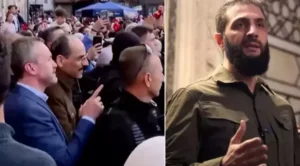
Bekir Gündoğdu: Flights start this week. There is talk about the reconstruction andreconstruction of Syria. What kind of a position do you think Türkiye can play here?
Kemal Öztürk: When I was in Aleppo, I saw merchants from Antep negotiating for a hotel. They wanted to open a hotel there. Now let’s think geopolitically. Let’s visualize the map of Syria. There is a border with Iraq. It is a big border. But there is a Shiite administration in Iraq. They have a bad experience because of the Iranian relationship. They were the entry andexit routes for Shiite militias. There was a lot of bloodshed because of this. It is not possiblefor them to have a close relationship with that country now. There is a border with Lebanon. The country is already in shambles. You can’t do anything to Israel. There is also theJordanian border. Jordan doesn’t have much power either. It’s tied to the US. They have not had a very pleasant relationship during this period. The only one left is Türkiye, which has a 900 km border. So even if we think geopolitically, Türkiye has to stay. But the moreimportant thing is this. In the last 5-6 years when everyone took their eyes off Syria, afterAleppo fell, as you know, a significant part of Aleppo settled in Idlib. HTS withdrew to Idlib. A large part of them entered Türkiye. But something happened in Idlib. HTS took over theadministration there. HTS, which everyone declared as a terrorist organization, which Türkiyeofficially declared as such. Idlib, which was bombed by the regime and bombed by Russia, suddenly turned into their training and practice ground. They practiced municipalitymanagement, built roads, operated hospitals and established health systems. It was a management experience.
Bekir Gündoğdu: So it was like a 10-year education.
Kemal Öztürk: Yes. After the fall of Aleppo, it turned into a training ground. There wasTürkiye there. They penetrated deeply, silently. And they transformed and changed it. I remember I was in Syria in 2013, during the war. I saw HTS, Al Nusra, Al Nusra militantsand I discussed many issues there. As an example of their mindset, for example, they wereshooting smokers. –Their religious Salafi interpretations considered smoking haram. NowHTS militants smoke. You know, this is an ironic example. But if you look at Colani’sstatements, something else has happened. There seems to be a radical change in understanding. Imagine, after a bloody past, you enter cities and you don’t take revenge. Youdon’t carry out executions in the streets. He says Kurds are the main elements of Syria. He says we will not interfere with anyone’s beliefs. It says we will live together. And it implements this. There is no looting. Now this shows that Colani has changed. It shows thatHTS has changed. For example, the statements of the governor of Damascus. We have nosuch thing as an Islamic state. There is no reality anyway. He says we need to build a freeSyria together. The governor of Aleppo is the same. They went through an education. Theywere influenced and changed. And Türkiye did this. I mean Türkiye provided it.
Bekir Gündoğdu: We see the Syrian people rejoicing in the squares. I mean, a revolutionaryprocess that started in 2011 and people who suffered for 12-13 years were exiled from theirhomeland. They have experienced deaths. Will these wounds be healed? I mean, do you thinkSyria can become one of the valuable countries of the region in a short time?
Kemal Öztürk: Surely they will have difficulties. You cannot fully understand thedevastation there without seeing the Syrian field. I mean, nearly 6 million people havemigrated from Syria. But more than 6 million people have also been displaced within Syria. In other words, Afrin, which used to be a Kurdish-dominated city, has turned into an Arab-dominated city. Kobani, Ayn al-Arab, used to be a predominantly Arab city, but it has becomea predominantly Kurdish city. The demography has been turned upside down. They had toleave their houses, they had to leave their fields. They were destroyed in the war. This is 50% of a country where 6 million people have been displaced, and if you add the 6 million outside, 12 million people have been mobilized, displaced and dispersed. The population is 22 million. It will take a lot of time to put them back together, to put them in their places, to find their oldhomes. But here’s what we should be surprised about. We have 61 years of Baath regime. 14 years of civil war. But Aleppo returned to normal in 2 days. In 3 days Damascus returned tonormal.
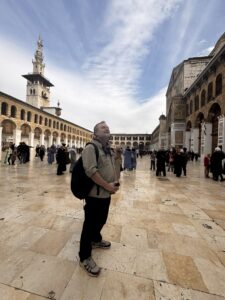
Bekir Gündoğdu: We see young people with brooms and flowers in their hands, organizingthe parks, sweeping the roads.
Kemal Öztürk: Yes, let’s say it can be symbolic. For example, this is what attracted myattention the most. Aleppo has been in the hands of the regime for 6-7 years, what happenedthere? There was a lot of suffering in Aleppo. I saw it when I was there during the war. Therewas a lot of destruction and a lot of suffering. Can you return to normal life in two days? Themunicipality is working, traffic lights are working, there are traffic police. It’s a strange thing. Damascus is the same way. I mean, the regime’s stronghold, its heart, the place where it madeall its investments. The bazaar opened in three days. People went back to their normal work. On the streets, young people and children are happy and playful. I asked Colani in particular. How did it happen? How did you do it? And how did you take Damascus so fast? First of all, HTS didn’t think they would take it so fast. Damascus was not in their targets.
Bekir Gündoğdu: Is that so?
Kemal Öztürk: No. Even Aleppo is debatable. In my opinion, there was no Aleppo. Theywill take the countryside, they will take the periphery and so on. There was no regime at thattime. This means that. When they started to advance towards Aleppo, they saw that theregime army had actually collapsed. They saw it on the ground. They were not there. Theysaw the decay on the field. It fell, it fell. Let’s go to Homs, let’s go to Aleppo, let’s go toHama. Then he said, “Leave everything and march to Damascus. This all happenedspontaneously.
I am absolutely sure. Damascus was not their target. They decided to take Damascus whenthey saw the rottenness and misery of the regime on the ground. The people were fed up, Colani tells me. The people were fed up with this regime. They suffered so much oppressionand so much hardship that it was like they were waiting for us.
When I entered Damascus I realized how much the people were suffering. I heard horriblestories, of that regime of intelligence, of that regime of fear.
Bekir Gündoğdu: You also went to Sednaya Prison.
Kemal Öztürk: Great pain, indescribable pain. Sednaya Prison in itself is a place that can describe the fear created by this regime.
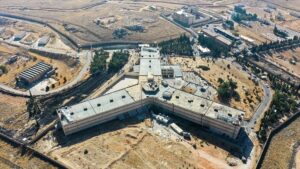
Bekir Gündoğdu: We saw press machines on social media, on television. We saw acids. Somepeople say that this is not happening, that this is speculation, but what is your opinion on this?
Kemal Öztürk: I talked to people who were in Sednaya prison in Damascus. 10 years, 15 years. So imagine a sentence like this. In this prison, a colonel came and said, “You will giveme this girl. And when we didn’t give her, they took her away by force. He asks a father forhis daughter. They took her to prison by force. Not for marriage, I mean. She is raped formonths. Systematic rape. And then she disappears. The majority of the survivors of Sednaya prison are men. Not women. I want to draw your attention. They are so systematically rapedthat they kill them and bury them in those mass graves in the back so that they don’t talk toanyone. For example, he told me a sentence like this. He said we don’t walk with our headsup. We walk by looking down. On the road when we were outside. Why? I mean, just in casewe run into an intelligence officer. He doesn’t like my type, he doesn’t like the way I look. He said we don’t talk looking up in case he takes me away. He said we didn’t go to mosques, forexample the Umayyad mosque. They would encourage us to come and visit. Shiites, Alawites. But we knew that if we went there for prayers, we would be tagged. He says wewouldn’t go to prayers. In Damascus, bread was rationed. Before the revolution. Can youimagine? You know how they used to advertise it in Türkiye, restaurants are this good, life is this good.
Bekir Gündoğdu: They were saying that the state was distributing free bread.
Kemal Öztürk: I saw ration cards, I saw bread ration cards, I saw gasoline ration cards. These are the people in Damascus. All this created a great boredom, a great weariness, andthe people were in the psychology of ‘enough is enough, let the regime go, no matter whocomes‘.
Bekir Gündoğdu: I watched an interview with a girl and she said that she is not afraid of HTS. She says that no system that can come, no order can be worse than before. She says nomatter what comes. They are that fed up, aren’t they?
Kemal Öztürk: The Republic of Fear can be described exactly like this.
Bekir Gündoğdu: In addition to fear, there were also a lot of drug factories. Even thebasement of Assad’s brother’s house was used as a drug factory. In fact, there is a drug cartelorganization rather than a state. They poison the countries in the region. For example, in Türkiye, our children have been poisoned. Why can’t this state fight against the scourge of drugs? Why can’t it stop it? So Assad was producing it and maybe sending it to Türkiye viathe PKK. It was being sold like hot cakes here. Do you have any impressions about this?
Kemal Öztürk: I did not go there. I didn’t go to the place where the drugs were produced. But everyone knows that that family, the Assad family and the circle around them is like a mafia gang. They had the audacity to go wherever they wanted with guns in their hands anddo whatever they wanted. He took a gun out of his waistband and put it in the man’s mouth. He took the restaurant from him. I heard such stories.
Bekir Gündoğdu: Businessmen being kidnapped and then Assad confiscating their property.
Kemal Öztürk: Of course he confiscates their property. And there is no law. He kills anddestroys. Can you imagine? We are talking about a place where 100 thousand people werekilled and buried in mass graves.
Bekir Gündoğdu: They are talking about one hundred thousand. Now we don’t know aboutthe other prisons. How many such prisons are there in Syria?
Kemal Öztürk: The prisons in Aleppo, Latakia, Damascus are mentioned as big prisonswhere such systematic tortures and executions were carried out. But I don’t know how manythere are.
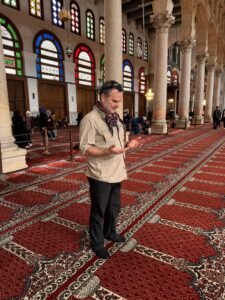
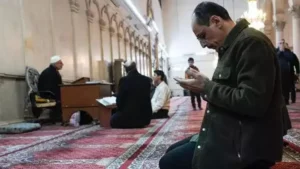
Bekir Gündoğdu: You visited the Umayyad Mosque. The Umayyad Mosque was once thesubject of political polemics. How did you feel when you entered the mosque? And of course, the most curious one, did you meet with Mr. İbrahim Kalın and our Head of NationalIntelligence Organization?
Kemal Öztürk: They criticized me a lot for saying that you were going to perform Fridayprayers. I am also someone who has been criticized a lot for his Syria policy and I used tohear this phrase all the time on talk shows. When there was so much polemic, naturally myfirst reflex was to go to the Umayyad Mosque, pray, pray for thanksgiving and share a photo. Of all the photos I shared from Syria, this was the most viewed, the most written about andthe most applauded. In other words, one and a half million people reacted to it. Because forthe last 10 years they have been criticizing Erdoğan and the government because of the prayerin the Umayyad mosque. Mr. Ibrahim Kalın is acting with the same feelings, the AK Party is acting with the same feelings or the President is acting with the same feelings. They werebattered and worn out more. The reason why Mr. Ibrahim Kalın went to the UmayyadMosque and prayed and posted a photo was to say that you have been insulting us for 10 years, but we finally got our way. He took that photo to say look, I am also at the UmayyadMosque.
Bekir Gündoğdu: Did you see the famous arrival with the automobile? Did you witness it?
Kemal Öztürk: Yes. I mean, that is a very interesting picture for me. I saw İbrahim Kalın sitting in the front of an armored vehicle. I wondered why he was sitting in the front. They sit in the back of the vehicle. Then I woke up when I saw the driver, I mean why İbrahim Kalın sat in the front. Because Colani was driving the car. Of course, I recognized him when I sawhim. Then I was even more surprised when he got out of the car. Now these have symbolicmeanings. They have strong messages. The CIA chief in America understood what İbrahim Kalın meant. Mossad understood what he meant. England understood. Russia understood it. They just don’t get it in Türkiye. Yes, in Türkiye they are also questioning why did you gothere? Some people still don’t understand what is going on and in fact don’t understand thiscountry itself. HTS was a terrorist organization, why did you meet with its leader? Why didyou post a photo of yourself praying? Why are you going to Damascus?’ They are so detachedfrom reality. They don’t understand the changing sociology. They missed the changinggeopolitics. And all of their arguments are arguments that have nothing to do with reality. Arguments that have nothing to do with the field.
Bekir Gündoğdu: 100 years ago, Syria is a piece of land that the imperialists took away fromus. Didn’t they cut all our ties in 100 years? So it is another state. You know, it came out of us but it has nothing to do with us anymore. Let them go to Syria. Let them be far away from us.The swamp of the Middle East…This is what they have instilled in the country for years.However, just yesterday, when we said Aleppo or Damascus, it was as if we were talkingabout Istanbul or Bursa, 100 years ago. When those cities were mentioned, we would think of cities like Ankara, Antep and Maraş. They were also part of this geography. They havedetached us from this context. They imposed the alienation they experienced mentally on thewhole country and society for years, right?
Kemal Öztürk: Yes. Geography has changed in minds. For example, is it farther to fly fromIstanbul to Beirut or to Erzurum? Everyone will say flying to Beirut is far. However, Beirut is closer. When you ask how long it takes to fly from Istanbul to Damascus, they probably thinkof 7-8 hours. It is one and a half hours. Damascus is 4 hours by road from Antep. Forexample, Urfa-Aleppo is 55 minutes. Now Aleppo is closer to Gaziantep than Ankara, closerthan Erzurum, closer than Diyarbakır, closer than Urfa. 55 minutes. Because these were citiesliving together. I mean, how are Maraş and Antep intertwined now? Aleppo was also likethat. Now, I wore this ring especially when I left. This is the form of the last Ottoman flag. People who see this ring call me Ottoman. Look, he remembers the flag. He remembers theform of the flag. He doesn’t just say Türkiye. He says Ottoman. And you see this flag form embroidered on the walls. In the castle, in the mosque. So this is a very deep relationship. But it has become so distant culturally. It has been so alienated. They think it is a completelydifferent place. However, for example, the first Turkish air martyrs were buried in Damascusin the Umayyad Mosque. There is a monument there. You can see the air martyrs of ourairplane that crashed in World War I next to the tomb of Saladin Ayyubi behind the UmayyadMosque. You will see the Turkish flag. His grave is there. At the end of this alienation, theydon’t understand. Why do we feel this way towards Aleppo, towards Damascus? Why do theyfeel this way towards us? Some people in Türkiye cannot comprehend this.
Bekir Gündoğdu: You met with Colani. Did you also meet with the head of our NationalIntelligence Organization?
Kemal Öztürk: I did, yes. I mean, I guess meeting the head of the MIT in Damascus is onlypossible for journalists who were born on Laylat al-Qadr night. And that was possible for me. But I was not born at night. As a journalist, an interview with Colani can only be granted tothe Ashura-i mu’mbashshara. I was also blessed. That’s why the Syria trip was a veryexceptional trip in my professional life. I hope I will have the chance to go again when thesituation improves, when the government is formed and the system is in place. There is Umayyad Square in Damascus, it is the biggest square and demonstrations and celebrationsare taking place there. One of the members of the new administration there said to me, ‘I hopewe will meet in Jerusalem one day‘. I hope so. I would very much like to meet İbrahim Kalın in Jerusalem one day. I would very much like to meet him in Gaza. And I think this is not a dream.
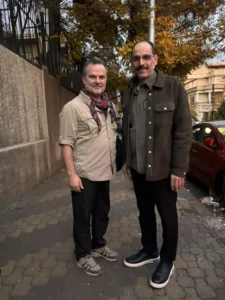
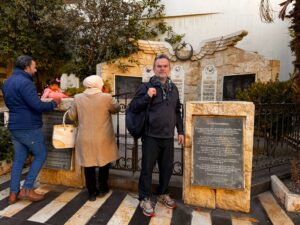
Bekir Gündoğdu: There is also the problem of the territories held by the terroristorganization called PYD, SDF. This is actually the most curious issue in Türkiye right now.They are there under the protection of the US. What will be the situation here? In the nearfuture, do you think there is a possibility that their ambitions to establish a state here will be realized?
Kemal Öztürk: I see the possibility as zero. Geographically, Deir ez-Zor, that is, Kobani andHasakah Qamishli are side by side in the south. The Arab tribes have taken Deir ez-Zor southof it. Raqqa is under siege. West of the Euphrates has been taken by Türkiye and the FreeSyrian Army. It is stuck in one area. There is nowhere to get logistics. There are no sources of income. Now we need to insist on this. It is necessary to distinguish between the Syrian Kurdsand the YPG. The YPG’s ideological structure, ideas and relations are very foreign to theSyrian Kurds. Syrian Kurds are friends of Türkiye. But because the PKK’s ideological sidehas poisoned them, the US has armed some of the people there. It thinks it will rule thatregion with weapons. It failed in Deir ez-Zor. It could not rule in Tel Rifat. He couldn’t rule in Manbij. Now, on the 14th of the month when we had this interview, he wanted the dam in theKobani region to evacuate the area where the Tomb of Suleyman Shah is located until 5 o’clock. That will also take place. They will also leave Kobani, I don’t see it possible for it tosurvive. Türkiye has announced a very serious road map on this issue. PKK will leave theregion. YPG leaders will leave the region. Non-Syrian soldiers, fighters, whoever is in theSDF, in the YPG, the PKK will leave. They will leave their weapons. They will be subject tothe new administration. A big manifesto. Let’s call it a racon cutting, so to speak. But I see thesame things in the HTS leadership. HTS leader Colani said that Kurds are the main element of this country but PKK is a terrorist organization. No armed group will be left on its own. Theywill be connected to the Ministry of Defense.
Bekir Gündoğdu: Is there any public support in the region?
Kemal Öztürk: We see demonstrations on social media, on the news. If you look at theEuropean media, you will see labels saying that Alevi genocide is taking place. You will seelabels saying Kurds are being massacred. Likewise, you see labels saying Yazidis are beingmassacred. It has nothing to do with reality. Syrian Kurds have an ontological incompatibilitywith the PKK. They cannot get along. And that is why Kurdish tribes are now carrying theflag of revolution. They clashed with the people in Raqqa and Deir ez-Zor. They fired guns at the citizens. I don’t see any support there. They think they will survive because they rely on American weapons and armored vehicles, but this will not be the case. I think this movementhas faced the biggest liquidation process in the history of the PKK. In other words, either thatgroup will retreat back to Qandil, they will leave the mountains, or there will be big clashesand they will lose again.
Bekir Gündoğdu: I mean, if a democratic process were to take place, do you think they wouldhave any thoughts of contributing to the democratic process by becoming a political party?
Kemal Öztürk: If they lay down their weapons, why not? I mean why not? The team that is involved in terrorism and bloodshed should leave. Let the remaining ones form a party. Let’ssee if the Kurds vote for them or not. Kurds will not vote as much as they expect for theSDF’s extensions within the established parties. We will see this too. They need to integrateinto the system, and that means laying down their arms.
Bekir Gündoğdu: Trump is coming to America very soon. He made a statement the other daythat we don’t have an agenda for Syria, it’s their internal affairs. Do you think this means thatAmerican troops can withdraw from Syria?
Kemal Öztürk: Not exactly. Because this is a Pentagon project. A Turkish general evendescribed it to me like this. East of the Euphrates is the Pentagon’s operational area, west is the CIA’s. The CIA lost the west, the east is the Pentagon’s area of operation. This project of establishing a state for the PKK in the Rojava region is a Pentagon project. The Pentagon alsoresisted Trump in his last term. You know, at that time, he said let’s get out of Syria. ThePentagon resisted. Now he says let’s get out. The Pentagon is resisting again, but I don’t thinkthey will resist after January 20. America will withdraw. And it will come to an agreementwith Türkiye. It has no other chance. Geopolitically it cannot survive. Economically it cannotsurvive. Politically, it is not possible to find a base there. It is not possible for the newadministration to accept this. How will they live when they take all the oil fields away fromthem? The door in Iraq is closed. Türkiye is closed. The southern side is closed by the newadministration. Where will they live? Where will they get logistics? Will they constantly landat the US Air Force airport in Qamishli? It is not possible for him to survive. They are chasingpipe dreams. On the backs of the Kurds, they are also tormenting the Kurds. This game mustend now. I think Türkiye and the new Syria will end this game and the Kurds will be relieved.
Bekir Gündoğdu: How will the Syrian revolution affect the countries in the region? I mean, now Syria has neighboring countries. Jordan, Iraq, down below Lebanon and even Egypt.
Kemal Öztürk: Now I see a big morale boost in the region. I mean, I see a big morale boostamong those who oppose the regimes. The region has suffered a lot. Gaza has already ruinedus. But there is a morale boost in everyone. There is a morale boost among the opposition, allregime opposition, the opposition against authoritarian regimes.
Bekir Gündoğdu: People who see that it can be possible, that’s the most important thing.
Kemal Öztürk: Yes. If Assad is destroyed, anyone can be destroyed. Assad’s mukhabarat is world famous. But now the idea that if Assad is destroyed, anyone can be destroyed has settled. That’s why these authoritarian regimes are afraid. I think it will trigger Egypt. I thinkthe new generation of the Ikhwan movement will change and transform itself. I think Hamas will renew itself. I think there will be a serious change in Lebanon. I mean, I think the Sunnisection will come to the country more effectively after the Shiite Hezbollah loses power. I think these will affect over time. Jordan is actually a very weak link. When a strongopposition is formed in Jordan, I think Jordan will also change. We will see in the comingdays. I also think it will happen fast.
Bekir Gündoğdu: Let’s ask about the Shiite crescent. The Shiite crescent project is over withthe revolution in Syria. Because the most important pillar was Syria. It is a line comingthrough Iran and Iraq. What will be Iran’s influence in the region in the next conjuncture? Orcould the revolution here, the Syrian revolution have an impact on the regime and system in Iran?
Kemal Öztürk: I don’t think it will have a great impact. I don’t think that the Iranian regimeis a regime that can be overthrown so quickly. Although we were saying the same thing aboutAssad, now that it is so fast, you have to speak cautiously. The commander of theRevolutionary Guards even made a victory out of this Syrian defeat, saying. He made a statement that the last army of the revolutionary guards left Syria. Now, I didn’t reallyunderstand what the Shiite crescent was a crescent movement against. Was it a movementagainst Israel? Exactly that crescent. You know, what they call the Turkish crescent, on thebattlefield, you open up like this, you encircle, you destroy. What is this Shiite crescentagainst?
Bekir Gündoğdu: I think their crescent is about encircling Türkiye.
Kemal Öztürk: I don’t know what it is against, but Iran is the biggest loser in the region. Itlost Lebanon, it lost Syria, it lost great power in Iraq. They only have Yemen and the Houthisleft to influence. There is no one else left. Today, the President of Iran made a statementsaying to lower the boilers by two degrees. They have an energy problem. The oil countrymade a statement to turn down the boilers. Schools were canceled due to air pollution, electricity problems and cold winter. All this happened today. Iran’s economic problems are at their peak. If the people react to this in a big way again, there will be an upheaval in Iran, but regime change can happen with blood. I do not expect any other kind of change there. As longas Khamenei lives, there will be no change there. It will be bloody, and I hope it won’t be. The Iranian people have suffered a lot. I don’t hope or want anything bloody to happen thereeither. But I see the possibility of Khamenei changing as zero. I see Pezashkian as morereasonable. He has all the powers of the revolutionary guide. Pezashkian does not have anyauthority. If this change happens, if Iran revises itself and integrates with Türkiye, it will be a little more relaxed, but otherwise Iran is in for troubled days. You will see that they will getout of Iraq to a great extent.
Bekir Gündoğdu: So, can Iran be tried in the international criminal court for the war crimesand massacres in Syria? Because everyone has this expectation. International organizations, institutions, associations, foundations will come and document the war crimes in Syria and a court process should be initiated against the Assad regime and its leaders, as well as Iran andRussia who support them. Do you think Iran and Russia will get their share from this?
Kemal Öztürk: I think they should. They have no less sin. Russia has massacred as much as the Assad regime in the region. The massacres committed by its helicopters and airplanes areincalculable. Iran is the same. Syrians do not consider the massacre of Iranian militias as inferior to Assad’s massacre. That’s why they distributed halva when Nasrallah died. So theysuffered a lot. I hope we will not leave Assad like this. The world should not leave him likethis. The main responsible of that cruel system should be put on trial. It should be an examplefor all dictators, especially Netanyahu. When I saw the atmosphere in that prison, I said thereis no need to look for any other evidence. It is such a horrible, unbelievable place. I hope he will be tried. Even in absentia. I also hope that the Iranians and Russians will be tried. Let’ssee if the international community will see these crimes. I mean, we see that the massacrescommitted against the Jews in Germany during the Hitler era are being carried out in Syria, maybe twice as much. But will the world see this? And we will test the hypocritical attitudeof the West once again.
Bekir Gündoğdu: Mr. Kemal Öztürk. Thank you very much.
Kemal Öztürk: Thank you very much. I wish you a good broadcast.


